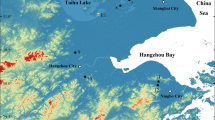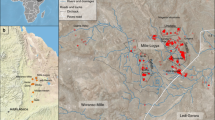Abstract
Easter Island is the most isolated piece of inhabited land in the world. It exhibited an unique megalithic culture1–3, involving the sculpting of giant statues (moai) especially between AD ∼1400 and ∼16804 when, for unknown reasons, the culture suddenly collapsed. The island is also of interest in relation to Pleistocene climatic change as CLIMAP5 predicted no reduction of sea-surface temperatures for this part of the Pacific at 18,000 yr BP. We have obtained fossil pollen records covering the past 37,000 yr from three craters on the island. They suggest that the late Pleistocene climate was cooler and/or drier than the present one. They also suggest the former existence of forest on the island, and its decline in the last millennium. This decline was probably due to deforestation by man and could have caused the cultural collapse.
This is a preview of subscription content, access via your institution
Access options
Subscribe to this journal
Receive 51 print issues and online access
$199.00 per year
only $3.90 per issue
Buy this article
- Purchase on Springer Link
- Instant access to full article PDF
Prices may be subject to local taxes which are calculated during checkout
Similar content being viewed by others
References
Routledge, K. The Mystery of Easter Island: The Story of an Expedition 165–199 (Sifton, Praed, London, 1919).
Metraux, A. Easter Island: A Stone-Age Civilization of the Pacific pp. 149–170 (Andre Deutsch, London, 1957).
Metraux, A. Bernice P. Bishop Mus. Bull. No. 160 (1971).
Heyerdahl, T. & Ferdon, E. N. Jr (eds) Reports of the Norwegian Archaeological Expedition to Easter Island and the East Pacific Vol. 1 (Forum, Stockholm, 1961).
CLIMAP, Science 191, 1131–1137 (1976).
Gonzalez, D. F. The Voyage of Captain Don Felipe Gonzalez in the Ship of the Line San Lorenzo, with the Frigate Santa Rosalia in Company, to Easter Island in 1770–01 (Hakluyt Society, Cambridge, 1908).
Cook, J. A Voyage towards the South Pole and Round the World, 1772–75, 1 (Strahan & Cadell, London, (1777).
La Perouse, J. F. de G. Voyage de La Perouse Autour du Monde, Paris, 1797 (English translation) (Johnson, London, (1798).
Skottsberg, C. The Natural History of Juan Fernandez and Easter Island Vol. 1, 193–438 (Almqvist & Wiksells, Uppsala, 1956).
Alden, B. Nouveau Regard sur L'ile de Paques, 119–122 (Moana, Corbeil, 1982).
Flenley, J. R. Asian Perspect. 22, 33–40 (1979).
Hafsten, U. Arbok Univ. Bergen, Mat-Naturv. Ser. 20, 1–48 (1960).
Pennington, W., Cambray, R. S., Eakins, J. D. & Harkness, D. D. Freshwater. Biol. 6, 317–331 (1976).
Balgooy, M. M. J. van Plant Geography of the Pacific, Blumea Suppl. 6, 1–222 (1971).
Selling, O. H. Bernice P. Bishop Mus. Spec. Publ. 37–39, Honolulu (1946–48).
Salgado-Labouriau, M. L. Grana 21, 97–102 (1982).
Brown, F. B. H. Bernice P. Bishop Mus. Bull. No. 130 (1935).
Mulloy, W. J. Archaeol. phys. Anthrop. Oceania 5, 1–23 (1970).
Heyerdahl, T. Aku-Aku (Allen and Unwin, London, 1958).
Author information
Authors and Affiliations
Rights and permissions
About this article
Cite this article
Flenley, J., King, S. Late Quaternary pollen records from Easter Island. Nature 307, 47–50 (1984). https://doi.org/10.1038/307047a0
Received:
Accepted:
Issue Date:
DOI: https://doi.org/10.1038/307047a0
Comments
By submitting a comment you agree to abide by our Terms and Community Guidelines. If you find something abusive or that does not comply with our terms or guidelines please flag it as inappropriate.



